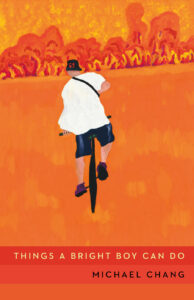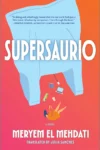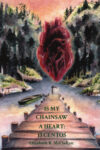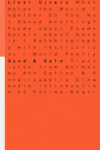
[Coach House Books; 2025]
Parataxis is old hat: in contemporary poetry, it can feel dystopian, with the speaker straining for connection amid the equalizing wash of media saturation. “Everything connected by ‘and’ and ‘and,’” as Elizabeth Bishop put it back in the 1940s. But the poems in Michael Chang’s Things a Bright Boy Can Do seem to delight in the absurd potential of randomness. Disjunction, in Chang’s hands, is a source of effervescent energy and a chance for both humor and depth. This joyful book simultaneously journals the poet’s most random thoughts and gives a tour de force on how to create meaning out of chaos.
In interviews, Chang identifies as an inheritor of the New York School of poetry. Their work, over six collections, bears an urban sensibility and an effervescence and affability that mines that lineage. But the form and content Chang’s poems are firmly rooted in our decade. The predominant form is the one-line stanza that eschews enjambment, which allows each line to feel like a complete, pithy thought. The content of Chang’s stanzas range widely, but almost always comprise up-to-date, contemporary referents. For example, “鬼地方 UNHOLY PLACE” starts with:
u try so hard for everyone else, wut abt doing something for urself
google search: charlie puth height
brodsky claimed that birds in poems = the poet themselves
The first stanza parrots the language found in popular self-help articles. Surprisingly, the second stanza is a jokey response to the first: what the poet would like to do for themselves, it turns out, is to indulge in celebrity statistics and look up the physical statistics of a popular singer. Though the second stanza answers the first, the self-sufficiency of each stanza brings to mind the dominant modes of communication on social media—status updates or tweets. The content of these lines is modish language and hot celebrities, but, as for the New York School poets, such as Frank O’Hara and John Ashbery, the question is how to deal with living in a highly social and unstable world.
Chang revels in the chaotic energy of contemporary randomness, and some of this energy comes through in their creative and unconventional methods to create linkages between lines and stanzas. In addition to the second stanza in “鬼地方 UNHOLY PLACE” being connected to the first as a jokey response, the third stanza is connected to the second through punctuation and syntax. Both stanzas are bisected by a punctuation: “=” and “:”, respectively, though the syntactic functions of the punctuation differ. Here, the “connective tissue” is syntactic, but image, sound, typography, and other elements of grammar are employed elsewhere.
Chang often leverages the patterns created by these linkages to develop darker subjects of alienation that feel almost at odds with their stylistic energy. For example, “CIRCUIT CITY IS BURNING” uses linked typography and a floating second-person voice to depict the subconscious connection between self-doubt and racism. In the middle section of the poem, the speaker is a poet submitting poems for publication:
Other times I’m submitting & the little voice says ‘don’t u think that’s
a bit much’
& I say SHUT UP MOM
A white businessman once told me
‘we can’t have a mayor named CHEW-EE’
He prob called me from his landline
The poet-speaker hears an inner voice of self-doubt, which they rebuff with a humorous and lightly insulting “SHUT UP MOM.” The following line retells an anecdote of a white businessman’s racist remarks about not wanting a mayor with a Chinese-sounding surname. What is unexpected is the connection Chang draws between the speaker’s inner voice and the businessman’s external one. The connection is created through parallels between the speaker’s remark “& I say SHUT UP MOM” and the businessman’s “‘we can’t have a mayor named CHEW-EE.’” These lines share syntactic structure and typography: both lines feature reported speech and use upper case (“SHUT UP MOM” and “CHEW-EE”). The speaker has, by this point in the poem, incorporated their inner doubt, the irascible voice of their brash confidence, and the insidious voice of external racism into a single voice. The speaker’s roving ambiguity continues to the last line of the poem:
U can be good cop
Daz cute daz cute
U got a sister ??? haha
Do u like it here
The three lines preceding the last function as throwaways, which make the final “Do u like it here” startlingly evocative. This line could be read as casual question by a bystander, but it could also be read as the speaker’s words to themselves (“This is a place where people believe a mayor can’t be named CHEW-EE; do you still like it here?”). The formal patterning and deployment of a floating speaker are a poetic apparatus to embody and depict the diffuse and contaminatory nature of self-doubt, author(ity), and racism.
Part of the fun of Chang’s collection is the constant in-your-face references to the poetry world. Chang throws down the gauntlet with the assumption that readers will readily get the in-jokes. For example, “BABY DRIVE SOUTH” relies on readers’ familiarity with well-known poets for its comic effects. Each of its stanzas names a famous poet and yokes them to an absurd action: “Coles SWENSEN choked on a gummy worm / Monica YOUN worked sixteen-hour days at the circus.”
Chang’s handling of queer desire is less blatant but more pervasive. There’s something a bit burnt-out and jaded in Chang’s attitude towards the body and its potential for romantic desire. In “MY SAD CAPTAINS,” the speaker expresses his envy of a fellow poet through a sexual analogy: “hats off to u / dick irresponsibly big // needling me as i polish my horns / a tiny fist.” Not only does the fellow poet balloon in dimensions, but the speaker comically shrinks and until they are masturbating erect “horns” with “a tiny fist.” But the yearning for romantic connection hasn’t evaporated. “SWALLOW YOUR POISON” contains the most abject moment in the collection and poignantly describes a moment of failed connection:
I tell myself I fucked up with you but I know I didn’t there were two
deaths that night I will never forget your tiny mirrors you are so
beautiful why do you need them your perfect thighs I hate them I
resent beauty I fucked up I’m sorry just the same
Here, the run-on sentence conveys the speaker’s desperation, as if they were trying to stave off the consequences of having “fucked up” through endless speech. Simultaneously, the shortening of syntactic units within this run-on appears to track a sense of growing urgency. The speaker degenerates from an extended statement “I tell myself I fucked up with you but I know I didn’t” to simple three-word utterances (“I resent beauty” and “I fucked up”), depicting an increasing sense of abjection.
Chang’s poems feature a smattering of Chinese phrases that often idioms, colloquialisms, or pop culture references. For example, the Chinese in the title, “鬼地方 UNHOLY PLACE,” which literally means “unholy place,” might also be translated as: “What the hell is this place.” Their presence seems to represent the mental goings on of a poet fluent in both English and Chinese; one can imagine Chang’s mind hopping frictionlessly from an English reference to a Chinese one. These snippets of Chinese confront Western readers with a cultural milieu that is largely inaccessible, but Chang takes care to prevent readers from pulling away in bafflement. The poems are fastidiously courteous in that they provide an in-line translation into English wherever Chinese characters appear. Their presence, though, is a reminder of who Chang’s speaker is: someone who isn’t afraid to show us everything that has caught their attention, and who will delight us in the showing.
Angelo Mao is a writer and biomedical regulatory scientist. His first book of poems, Abattoir (2021), won the Burnside Review Press Book Award. He also edits DIALOGIST, an online journal of poetry.
This post may contain affiliate links.






